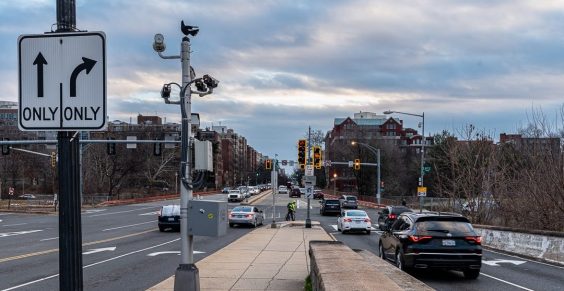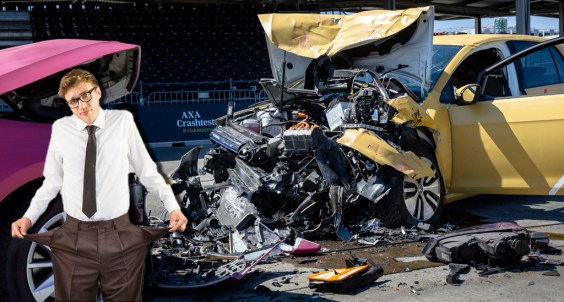
The problem seems simple enough: The federal transportation program is going broke because Washington has allowed the gas tax to be eroded by inflation for more than 20 years.
As obvious as raising the gas tax may be, America's political leaders won't touch it. Yesterday, The Hill reported that Congressman Bill Shuster, chair of the Transportation and Infrastructure Committee, is ruling out a gas tax increase or any additional fees on driving to fund transportation.
Apparently, anything that might make driving a little more expensive is no longer politically palatable. Instead, President Obama and members of Congress have trotted out a series of proposals that range from one-off gimmicks to total fantasies that wouldn't solve anything.
It can be hard to keep them all straight, so here's our ranking of ideas to fix federal transportation funding, from worst to best.
Eliminating Federal Funding for Biking, Walking, and Transit
We hesitate to even call it an "idea to fix federal transportation funding," but at the bottom of the pile is this stinker from the Koch brothers contingent. It has gone over like a lead balloon in Congress twice, but it satisfies the urges of the far-right wing of the Republican Party.
Abruptly eliminating federal transit funding would be catastrophic for transit agencies and city economies nationwide. A variant on this idea -- eliminating federal support for biking and walking only -- would not even come close to fixing the Highway Trust Fund, but it would cut off funding for projects that reduce congestion and improve safety. The federal government currently spends under a billion dollars per year on walking and biking, or less than 2 percent of its transportation spending.
GRADE: F
Royalties From Increased Oil Drilling
House Republicans tried this in 2011 -- another ideological fantasy masquerading as a policy solution. The proposal would have directed the Secretary of the Interior to increase offshore oil drilling and pump the added royalties into transportation. Since those royalties wouldn't materialize for a few years, if at all, Erich Zimmermann of Taxpayers for Common Sense pointed out that the plan would actually cost the government upfront. "Sounds like a recipe for doubling down on our current deficit mess," he said.
Not to mention the fact that increased fossil fuel extraction would only lead to more driving and the creation of a more expensive transportation system with more highway miles to maintain. Unsustainable on multiple levels.
GRADE: F
Pension Smoothing
This idea actually had some political legs about a year ago. It would work like this: Allowing corporations to short change their pension funds in the near term would generate additional taxable income, with the proceeds diverted to transportation spending.
The Bipartisan Policy Center noted that this strategy doesn't actually raise money, while making it more likely that taxpayers will end up providing emergency retirement support to desperate seniors.
GRADE: D-
Cuts to the Postal Service
A GOP plan floated in the last round of transportation bill negotiations would have generated $10 billion over 10 years by cutting delivery of mail on Saturdays. Since the Highway Trust Fund is expected to rack up a deficit of $167 billion over the next 17 years, that wouldn't exactly balance the books, without even wading into the question of whether transportation funding should be linked to levels of postal service delivery.
GRADE: D
Overseas Tax Holiday
This plan was floated by the oddball coalition of Nancy Pelosi and Rand Paul. The idea is that some of the $2 trillion in U.S. corporate profits hiding out overseas would return to the U.S. if the tax rate were lower than the current 35 percent. Paul's proposal would temporarily lower the rate to 5 percent for companies repatriating their profits.
The problem? Well, there are many, but you could start with the fact that it would only increase the incentive for corporations to stash profits overseas in the future, as they await the next "tax holiday."
And, of course, this idea is completely divorced from the transportation system itself. That hasn't stopped Shuster from saying it's his favorite strategy for the current reauthorization effort.
GRADE: D
Continue to Bail Out the Highway Trust Fund With General Fund Money
This "plan" seems to be one of the more politically feasible ones. After all, it's the one lawmakers have opted for the last five times the HTF ran out of money, and it closely resembles doing nothing. But it has some distinct disadvantages.
More than $50 billion has been dumped into the HTF from general fund revenues since 2008. And according to yesterday's report from The Hill, lawmakers are preparing for the possibility of another bailout very soon.
That means Washington is ready to continue diverting money from other important public priorities like education and healthcare. The longer Congress drags its feet, the bigger the cost will be.
GRADE: C-
Obama's Overseas Business Tax
Obama's recent proposal for shoring up transportation funding sounds pretty similar to Pelosi and Paul's. But instead of relying on a one-time tax break, Obama would institute a one-time tax on overseas profits. Politically, it seems to be going nowhere, and like all of the proposals with lower grades, it has nothing to do with transportation and won't provide any long-term solution. But it would avoid some of the perverse incentives in other proposals, and it's not as silly as the postal service idea.
GRADE: C
Instituting a Mileage Fee
Assessing a fee based on miles driven eliminates some of the problems with the gas tax: Namely, increasing efficiency of vehicles is gradually eroding its usefulness.
While there are some mileage fee pilot programs in place, it doesn't seem ready for prime time yet. No one has quite figured out how to assess and collect a mileage charge.
GRADE: B+
Raising the Gas Tax
The obvious choice is the best choice. Take away the ridiculous politics, and raising the gas tax is simply the most common-sense way to fund transportation. With gas prices having just fallen so steeply, the effect at the pump would barely register with drivers. Lawmakers still can't muster the courage to touch it.
There was a proposal from Oregon Congressman Earl Blumenauer to raise the gas tax 15 cents per gallon over three years, but it went nowhere. While many states have raised their gas taxes and those lawmakers have been overwhelmingly reelected, no such fortitude exists at the federal level.
Grade: A
So what's actually going to happen? According to The Hill, lawmakers are most likely to pursue the Pelosi/Paul repatriation idea or another extension paid for with general funds. The Hill's Keith Lang reports the lawmakers are already discussing the possibility of an extension because, as Shuster said, tax reform proposals take a long time. The Highway Trust Fund is heading for another bailout by May 31.




